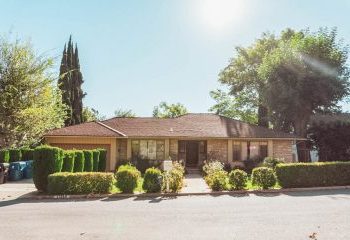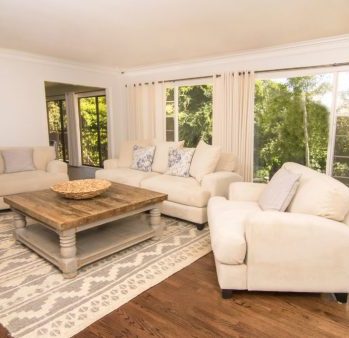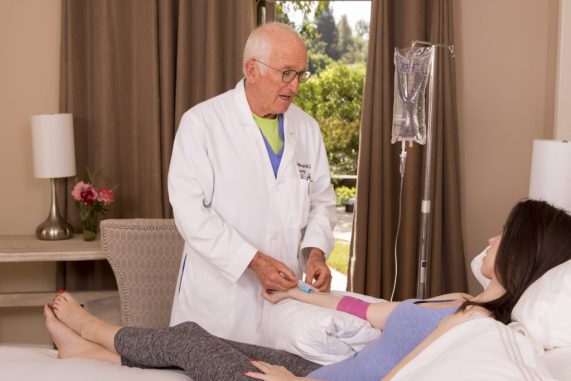Novo Detox is a treatment center with a detox and inpatient rehab facility in Los Angeles, fully accredited by The Joint Commission, the California Department of Health Care Services, and the Substance Abuse and Mental Health Services Administration (SAMHSA).
We are the best detox and rehab center for addiction in California because we have a full staff of caring and empathetic, dedicated experts available to our patients 24 hours a day, 365 days a year. Our drug and alcohol detox and rehabilitation programs have a high recovery rating, with our patients avoiding the ping pong effect.
Our Gallery
Why patients choose detox & rehab programs at Novo?
Focus on safety & comfort
24/7 supervised detox
Top Rated facility
Effective treatment
Healthy meals
Quick admissions
Evidence-based Therapy
Great locations Nationwide
- Rehab Near Me: Best Detox & Rehab Center for Addiction in Los Angeles
- Highest Rated Alcohol Detox Program
- Drug Detox Program
- Top Alcohol Rehab in Los Angeles
- Drug Rehab in Los Angeles
- How Much Does Rehab Cost in Los Angeles?
- How Long Is Detox?
- How Long Is Rehab?
- Additional Therapies & Addiction Treatments Available:
- Dual Diagnosis Treatment
- Does My Insurance Have Coverage For Rehab?
- Why Choose Novo Detox
Rehab Near Me: Best Detox & Rehab Center for Addiction in Los Angeles
Novo Detox is a treatment center offering the latest detox and inpatient rehab programs available in the Los Angeles, California area. We provide the most effective addiction treatment programs through proven detox, rehab, and therapy methods using the latest advancements in the industry.
Our staff is comprised of dedicated experts who are committed to helping each patient find the solution to their drug or alcohol addiction. Our addiction rehab facility offers luxurious accommodations to ensure patients are comfortable with us throughout their rehab journey. When you choose to tackle your addiction with Novo Detox Los Angeles drug rehab, you will be guided throughout the healing process, even after leaving our treatment center.

Highest Rated Alcohol Detox Program
Alcohol detox does not need to be scary or dangerous. At Novo, our treatment plans emphasize comfort, medical safety, and nourishment, ensuring you are a part of all decisions and maintaining your dignity as your body purges the toxins from your system.
The first step is intake, where you will be assigned a therapist and screened for mental illness, physical health, and your history of substance abuse. This helps us create a plan that is right for your unique situation.
Throughout detox, we will work alongside you to ensure you are receiving the treatments you need when you need them, monitoring your progress, and making changes to your personal plan when needed to ensure you remain safe and comfortable. You will be provided with prescription medications to ensure your withdrawal symptoms don’t become dangerous seizures or delirium tremens, as well as to help with discomfort, stomach issues, agitation, restlessness, and alcohol cravings. You will be assisted daily with coping techniques that include therapy, movement, and stretching.
Alcohol detox may take anywhere from a few days to a couple of weeks depending on the severity of the addiction, your physical and mental health, and other aspects. You will be supervised 24 hours a day to ensure things progress to plan by our knowledgeable, experienced staff. During alcohol detox in California, we also allow contact with loved ones and friends, as we believe success is compounded by the additional support they can provide.
Drug Detox Program
Drug detox, like alcohol detox, is provided in our full-time private, relaxed care facility with 24-7 onsite nursing and an on-call medical doctor. You will get a full psychiatric evaluation, along with medication management, and if you are detoxing from opiates or benzodiazepines, a tapering program is provided to ease the detox process. You will have individual therapy sessions, meet with a primary therapist once a day, and have daily help using natural methods to ease the discomfort of detoxing.
Our focus is on treating withdrawal symptoms safely, quickly, and effectively, while ensuring you are treated with respect and care. Common drug addictions we treat at Novo include:
- Opiates like heroin, oxycontin, morphine and oxycodone
- Amphetamines like meth, speed, and Adderall
- Anxiety drugs like Xanax, benzodiazepines and Klonopin
- Alcohol
- Marijuana
Our team implements comprehensive admission tests when you enter our program, along with treatment from board-certified doctors, nurses, psychologists, and psychiatrists. Through cutting-edge DNA testing we can tell which medications and dosages will work best for your unique metabolism, and within a few days to a few weeks, the toxins will be eliminated from your body. You may be provided with medications to ease cravings, pain and stomach issues. Some people require medical interventions to deal with dehydration, and therapy to deal with anxiety and depression.
Top Alcohol Rehab in Los Angeles
During the residential level of care for alcohol rehab in Los Angeles, you will live full-time in our luxury treatment center. It is a small, six-bed facility, ensuring you receive plenty of one-on-one time with therapists, doctors, and treatment providers. You will have access to amenities like:
- A private chef and fully stocked snack bar
- Swimming pool
- Outdoor lounge area
- Workout and fitness classes
- Yoga
- Meditation
- Sound healing
- Housekeeping services
There are also entertainment options for your free time, including a smart TV with Netflix and PlayStation games. There are board games and books, as well as darts and community lounge areas. There is also a weekly store run for tobacco, food, or hygiene items you may wish to purchase with your own money.
Depending on your needs, you may also relate to an addiction psychologist, addiction psychiatrist, cognitive behavioral therapist, pain management specialist, chiropractor specialist, ortho healing, or physical therapist.
Facetime is offered for people who are away from their young children or infants, and you may have access to your phone during certain times after a blackout period.
Inpatient care is 30 to 90 days long, but you are not left on your own once it is over. We will work with you to figure out an optimal ongoing recovery plan, which may include outpatient rehab or connections to the local sober community, sober homes, and 12-step groups, so you can achieve long-term success.
Drug Rehab in Los Angeles
During the days, you will meet with your primary therapist a minimum of two times per week. If you wish, your therapist can contact your family on a weekly basis and/or conduct family therapy sessions if it is appropriate. You will also have a case management team to help you get back on your feet after rehab has completed, and work on life and vocational skills, meeting once a week.
Group therapy is a huge part of any inpatient rehab program at Novo, with an average of 40 to 47 hours of groups per week. There are several types of addiction therapies offered at Novo treatment center for alcohol and drug addiction, including:
- A full biopsychosocial assessment
- Cognitive behavioral therapy
- Dialectical behavioral therapy
- Interpersonal psychotherapy
- Life and social skills
- Nutritional health and wellness groups
- Denial management
- Relapse prevention
- Strength building
- Individual therapy and counseling
- 12-step fellowships (alcoholics anonymous or narcotics anonymous)
- Aftercare planning
Some of the group therapy options we provide at Novo include:
- Mindfulness
- Seeking safety
- Goal setting and achieving
- Anger management
- Healing through creativity
- Health awareness
- Distress tolerance skills
- Emotional self-regulation
- Cognitive restructuring
- Interpersonal relationships
How Much Does Rehab Cost in Los Angeles?
The cost of any rehab program in Los Angeles California varies depending on the length of stay inside the facility, and which medications and therapies you receive while in treatment. It is important to remember that although it may seem like a lot of money, it is worth it. Compare the cost of rehab to the costs of continuing drinking or doing drugs. Think about:
- How much you spend each day on drugs or alcohol
- Future health care costs due to substance-related issues
- The spiritual, emotional, and mental costs of addiction on not only you but your loved ones
- The quality of life you are living as a person with an addiction vs. who you could become
Contact our team to verify insurance or determine how much of your stay will be covered, and we will work alongside you to figure out the best way to get you the help you need right away.
How Long Is Detox?
The medical detox portion of your stay in our rehab center may be as short as three days, or as long as fourteen days. Your individual treatment plan will be created to best suit your needs. In general, the usual length of time for:
- Alcohol detox is 5 to 7 days
- Opioid detox is 7 to 10 days
- Benzodiazepine detox is 10 to 12 days
How Long Is Rehab?
Inpatient rehab is not all about physical detox. There are strong psychological and emotional elements to addiction, as well as behavioral health issues that need to be addressed. Every person will have a customized plan that provides for their own unique clinical needs, treating underlying issues within a safe, luxurious, comfortable, and sober setting. Rehab at the Novo’s wellness center may be 30, 60, or 90 days long in total.
30-Day
Spending 30 days in inpatient care is the minimum recommended time for most people in treatment for drug or alcohol addiction. The first month is a crucial time in which you can reset behaviors, reprogram the brain, gain a new outlook on life, and form new long-term habits while gaining recovery skills and relapse prevention tools that will last a lifetime. After 30 days, your risk of relapsing will be reduced significantly.
Long-Term Rehab
A longer 60- or 90-day stay in inpatient rehab is usually provided for people recovering from alcohol, benzodiazepines, or opioid drugs, as the withdrawal symptoms, cravings, and other health issues may resurface or remain after the initial detox is complete. People dealing with mental illness, trauma, and dual diagnosis can benefit from a longer rehab program as well, as the addition of psychiatric medications and therapies for mental wellness may take weeks or even months to set in. The longer you spend in the structured environment of rehab, the lower the chance of relapse is.
Additional Therapies & Addiction Treatments Available:
MAT
Medication Assisted Treatment (MAT) is provided at Novo in an integrated setting that combines:
- Medical care
- Therapy
- FDA-approved medications
- Holistic treatments
- Nutritious, organic food
This whole-patient approach to healing will ensure you stay comfortable while you are detoxing. Withdrawal symptoms that happen when you are quitting certain substances can be painful, debilitating, and scary. They can cause nausea and flu-like symptoms, head and body aches, restlessness, depression and anxiety, and serious side effects like seizures. Within a MAT program, you will not need to go through all of this pain. Instead, you will be provided medical and psychiatric care to ensure your body is comfortable and you do not experience distress as you purge the toxins from your system.
Cognitive Behavioral Therapy (CBT)
Cognitive behavioral therapy (CBT) is a commonly used behavioral therapy in treating substance use disorders and other mental health issues. This therapy treats underlying emotional health disorders and issues while focusing on modifying behaviors and thought patterns. In CBT, you will learn the reasons behind your self-destructive actions and thoughts and then find and practice alternate coping mechanisms.
Dialectical Behavioral Therapy (DBT)
Dialectical behavioral therapy (DBT) works on the psychosocial aspects of addiction. You will find the emotional and social reasons behind your substance abuse and other self-destructive behaviors, and learning to replace negative behaviors with positive ones. Mindfulness, distress tolerance, interpersonal effectiveness, and emotional regulation are integrated with behavior therapy methods in DBT.
Rational Emotive Behavioral Therapy (REBT)
Rational emotive behavioral therapy puts the focus on perspective, reasoning that no situation is “good” or “bad”. Instead, what matters is the way you look at it. REBT challenges patients to look at their own thoughts, emotions, and responses while addressing underlying issues and providing healthy coping techniques.
EMDR
Eye Movement Desensitization and Reprocessing (EMDR) therapy uses dual awareness, by focusing the attention on tapping or auditory tones while having you reconnect with the images, thoughts, and sensations associated with past trauma. Through dual awareness, your brain will be able to reprocess these memories, filing them away where they belong so they are no longer psychologically disruptive.
Relapse Prevention
Having a plan for what to do when you feel a relapse coming on is the best possible way to avoid starting drinking or using drugs again. Because addiction is a chronic brain disease, there is always the chance that you may stumble on your recovery journey. Knowing what to do next, with a full tool belt of coping skills and recovery tools, and having strong connections to a supportive community will keep you on track when times are tough.
Life Skills Training
When a person spends months or years using drugs or alcohol, they may miss out on learning the basic skills that everybody seems to know. Whether it is basic hygiene, cooking for yourself, balancing a budget, or communicating effectively with others, there are certain things that you can learn that will help you live a healthy life after rehab. Once addiction gets out of the way, you will be able to see an independent future for yourself, and we can help you fill in the knowledge gaps you may have.
Vocational Training
Employment and financial independence can make all the difference in life, and substance use disorders can be a huge barrier to getting a job. At Novo, we can help you get past issues like building a resume, finding a job, and interviewing so that you can begin to make your own money and become self-sufficient. Getting a job will not only bring in money, but you will have more opportunities to make new friends, practice your social skills, and it will give structure and purpose to each day.
Group Therapy
There are several types of group therapy. A group of patients will gather to discuss a particular topic or theme, as led by one or more counselors or therapists. This method of treatment is beneficial as you can see you are not alone in your issues, and you can achieve a new perspective on things through talking and listening. You can also gain new social and communication skills and have an empathetic, supportive group of peers to brainstorm with or gain new strategies from.
Experiential Therapy
Experiential therapy uses experiences (animal care, art, adventure, etc.) to help change feelings surrounding past trauma. This therapy works under the idea that perception determines behavior. Talking about psychologically disturbing events while in a completely different context will help you reframe emotions surrounding the event.
One-on-One Therapy
Individual one-on-one therapy (psychotherapy, talk therapy, or counseling) is a time when you and your therapist get together and discuss issues that are hard to face alone. If there is something that makes you feel sad, upset, or overwhelmed, or if something is interfering in your everyday life, your therapist can provide strategies and coping methods to help you move past it, improving your quality of life and reducing stress.
Family Therapy
Family therapy involves two or more family members and can be used to heal issues surrounding poor communication, grief, conflict, guilt, shame, trust issues, or other intense emotions. When it comes to addiction, family members may work together with the addicted person to improve their relationship and understanding of one another, and they may also seek therapy without the addicted person to learn how to best support them while avoiding codependency and enabling behaviors. Family therapy can help you heal old wounds, improve your relationships, and understand one another better.
Trauma-Informed Therapy (After PTSD)
Trauma-informed therapy focuses on seeing each person as an individual who has their own unique history and providing a safe environment that will not re-traumatize anybody. Using collaboration, open communication, empowerment, and consent during all treatments, care providers are able to recognize signs of trauma and work to create trust with each patient.
Physical Fitness
Exercise can help you get to know your body better and can help you appreciate your health. A regular exercise schedule coupled with therapy and other addiction treatments can promote long-lasting recovery in patients, as it can provide a healthy routine, distract from cravings, improve self-esteem, and provide stress relief. You will also be able to create opportunities to make new, health-conscious, and sober friends, especially if you join a sports team or fitness group.
Off-Site Activities
Inpatient rehab is imperative for many people, as it removes you from everyday life and provides you with a new, sober environment away from the stress and triggers at home. Staying inside a rehab facility day in and day out for 30 to 90 days may become monotonous, and many treatment centers will allow patients to take a break from the routine and try new things during an offsite activity like visiting a local nature spot or getting back out in the world for a few hours.
12-Step Rehab in Los Angeles
12-step integration works for many people recovering from drugs or alcoholism. This type of treatment acknowledges your lack of power over your addiction and compulsive behavior, helping you take stock of your life and make amends to those you’ve hurt. When you recognize a higher power, you may find ways to regain control over your life. In 12-step programs like Alcoholics Anonymous or Narcotics Anonymous, you will be paired with a sponsor who you can contact if you are going through a rough time.
Additional Therapies
Some of the additional therapies and addiction treatments that are provided at Novo include:
- Saltwater therapy
- Acupuncture
- Herbology
- Reflexology
- Detox massages
- Qigong
- Tai Chi
- Yoga
- Meditation
Dual Diagnosis Treatment
When a person has both a mental health issue and a substance use disorder (SUD), a dual diagnosis treatment is the best method to treat both at the same time. Using integrated techniques, therapies, education, medication, and counseling, a dual diagnosis treatment will address underlying issues and behaviors that impact both issues at the same time.
Anxiety Disorder
Anxiety disorders go beyond normal worrying. People with anxiety disorders may experience fear and distress, or have uncontrollable intrusive thoughts, feelings of “fight or flight” or panic attacks for no reason. Common symptoms of anxiety include:
- Anticipating the worst, watching for signs of danger
- Feeling panic, agitation, worry, dread, and irritability
- Excessive worrying
- Blank mind, trouble concentrating
- Rapid heart rate
- Sweating
- Shaking
- Dizziness
- Hyperventilation
- Nausea
- Insomnia
Types of an anxiety disorder include:
- Generalized anxiety disorder
- Panic disorder
- Phobia-related disorders
- Social anxiety
Bipolar Disorder
Bipolar disorder is a mental illness that causes extreme changes in mood, sleep patterns, and energy levels, shifting between depressive episodes (low mood and energy) and mania (high energy and mood). These episodes are different for each person but are defined by being distinct from the person’s baseline moods.
Manic symptoms include:
- Feeling jumpy
- High energy and increased activity
- Talking quickly, racing thoughts
- Irritable and easily agitated
- Risky or dangerous behavior
- Euphoria
- Making grandiose plans
- Insomnia
Depressive symptoms include:
- Feeling sad or hopeless
- Feeling anxious and restless
- Difficulty concentrating and forgetfulness
- Fatigue and energy loss
- Speaking slowly
- Sleeping too much or having difficulty sleeping
- Suicidal thoughts
Borderline Personality Disorder
A borderline personality disorder is a mental health issue that impacts the way a person feels about themselves and others, which determines the way they act and feel. Common signs and symptoms of BPD include:
- Fear of abandonment
- Extreme mood swings
- Shifting self-identity
- Feeling emptiness
- Impulsive self-destructive behavior
- Explosive anger
- Paranoia and dissociation
- Self-harm
- Unstable relationships
Codependency
Codependent relationships involve two people who have dysfunctional personality traits, causing one person to rely on the other to meet all of their emotional needs. It also involves a person enabling the other’s addictive or irresponsible behaviors.
Symptoms of codependency include:
- Low self-esteem
- Little or no set boundaries
- People-pleasing behaviors
- Caretaking others but not themselves
- Control issues
- Obsessions
- Denial
- Poor communication skills
- Making excuses for others’ behavior
- Painful emotions and stress
Depression
Clinical depression is a complex mood disorder that is characterized by prolonged emotional lows, feelings of hopelessness, and loss of interest in everyday activities that interrupt daily life. If symptoms of depression last for longer than two weeks, it is a serious depressive episode.
Symptoms of depression include:
- Feeling hopeless and helpless
- Unexplained aches and pains
- Low energy
- Difficulty concentrating
- Low interest in activities
- Change in appetite and sleep patterns
- Angry outbursts
- Dangerous behavior
- Self-loathing
- Suicidal ideation
Impulse Control Disorder
Impulse control disorder is more than just acting impulsively once in a while. When a person is unable to resist allowing certain emotions and behaviors to take over. A person with impulse control disorder may lie, steal, act aggressively, become agitated, or have trouble concentrating. They may also display low self-esteem, anxiety, and be socially withdrawn. Common impulse control disorders include:
- Kleptomania (uncontrollably stealing items that have no value to them)
- Pyromania (setting fires uncontrollably and being obsessed with fire)
- Intermittent explosive disorder (impulsive angry outbursts)
- Oppositional defiant disorder (challenging authority figures and losing their temper)
Post-Traumatic Stress Disorder
Post-traumatic stress disorder (PTSD) is caused by witnessing or being part of a traumatic event, like war, a natural disaster, the unexpected death of a loved one, or violence. It is characterized by experiencing stress and fear due to the body producing the “fight or flight” response, even when they are not in danger. Symptoms of PTSD begin three or more months after the initial event, and fall into four main categories:
- Intrusive thoughts/reliving events (flashbacks, dreams, hallucinations that feel real)
- Avoidance (going out of their way to avoid places, people, images, and other reminders of the incident)
- Reactivity and arousal (feeling anger or stress, with frequent outbursts)
- Negative thoughts and mood (thinking badly about themselves and the world around them)
Does My Insurance Have Coverage For Rehab?
Because of the Affordable Care Act (ACA) of 2010, certain types of behavioral health treatments, substance abuse and addiction treatments, and residential rehab may be covered, depending on which treatments and medications your provider covers. Novo Detox is a private rehab facility that works with PPO and HMO insurances, and we also take cash payments. We accept the following:
- Anthem Blue Cross Blue Shield
- Aetna
- Cigna
- Health Net
- Health Partners
- First Choice Health
- ValueOptions
We do not accept Medical and Medicaid.
Why Choose Novo Detox
Novo Detox center has a reputation for exemplary care for a reason. We provide:
- Concierge-level service
- State-of-the-art medical detox services
- Medication management
- Professional expertise
- Cutting edge science
- Caring staff
- Efficient treatment
- Holistic therapies
- Inpatient rehabilitation
We will ensure you retain your confidentiality, dignity, and sense of self and will do all we can to ensure you feel safe and cared for in all aspects of your treatment.
Along with in-person detox and residential rehab, Novo provides telehealth services for California residents that include group therapy sessions, weekly one-on-one therapy, case management, and weekly appointments with psychiatrists. We can also refer you to an outpatient rehabilitation facility near you that can provide you with a partial hospitalization program, an intensive outpatient program, or other aftercare treatments and outpatient care to keep you connected to a supportive sober community long-term.
If you are struggling with substance abuse or addiction, contact Novo Detox at any time. We are available 24 hours a day because we believe that quick access to admission may be the difference between life and death for some patients. We will work quickly to help you get the treatment you need as soon as possible.
We treat drug addiction, alcohol addiction, and dual diagnosis including anxiety disorders, bipolar disorder, borderline personality disorder, post-traumatic stress disorder, depression, codependency, and impulse control disorder.
Our medical detox programs are completely customized to suit your bio-genetic metabolic profile so that we can provide you with medications that will work best for your system. You will move into our small, 6-bed facility in the heart of Bel-Aire, getting
When you stay with us you will be provided with 24/7 medical care, and eat only the best, organic meals with fresh fruit and vegetables and smoothies. There are holistic treatments alongside traditional evidence-based therapies, including saltwater therapy, acupuncture, herbology, reflexology, detox massages, Qigong, Tai Chi, yoga, and stretching for a whole-patient approach to healing. Through physical and spiritual wellness, along with medications and doctors’ care, you will heal your body, mind, and spirit.
Once you have completed your stay in inpatient rehab at Novo, we will refer you to our partners in outpatient care, including telehealth options for virtual care, partial hospitalization programs (PHP), and intensive outpatient programs (IOP), so that you may continue receiving long-term support and treatment as you make the transition back into your everyday life.
If you or a loved one is struggling with addiction, call our admissions advisers. They will answer all your questions, help you decide what type of treatment program is right, walk you through our admissions process, check insurance benefits, and provide you with more information about the medical detox and rehabilitation plans we offer. We can even set up a clinic tour or reserve your room right away.










